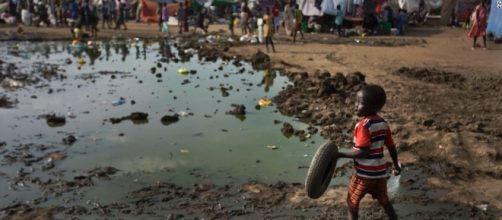Since gaining its independence from Sudan and being granted admission into the UN on July 13, 2011, South Sudan has been facing a horrendous humanitarian crisis. Despite trying to separate itself from decades of civil wars in Sudan, South Sudan has not fared much better since its independence.
The South Sudanese Civil War, which began on December 15, 2013, has resulted in an estimated 300,000 casualties and has displaced 3.5 million people out of the country’s population of 12 million. But, worst of all, the fighting has devastated the nation's agriculture and economic sectors which has left 5 million people in urgent need of food and water.
In fact, On February 20, 2017, South Sudan and the UN officially declared that parts of the former Unity State were experiencing famine.
However, South Sudan is not the only nation in the region experiencing foot shortages. Nigeria, Somalia, and Yemen, nations also dealing with their own bloody conflicts, are also in serious need of aid.
Pls retweet: 4 famines being mostly ignored by media: New WFP leader calls South Sudan's famine 'deplorable' https://t.co/fOchi9W1Bm @ABC
— Michael J. Puma (@FragileFood) May 23, 2017
South Sudanese Civil War
The South Sudanese Civil War began when President Salva Kiir Mayardit accused his former deputy Riek Machar Teny Dhurgon and 10 others of conspiring to attempt a coup.
However, it is widely believed that the split was caused by a long history of deep-rooted resentment between them over ethnic and tribal differences, with President Kiir belonging to the largest group, the Dinka tribe, and Machar belonging to the minority Nuer tribe. It is because of these ethnic differences that concern over the distribution of the country’s oil resources became a highly contested matter.
After Machar denied the allegations, he fled in order to lead the Sudan’s People Liberation Movement-in Opposition (SPLM-IO) as well as other tribal militias against President Kiir’s government forces. Unfortunately the conflict has proven to be a massive grey area in which both sides have committed unspeakable atrocities on one another which has forced the UN to step in in order to stabilize the situation.
The United Nations Mission in South Sudan (UNMISS) was subsequently formed which consisted of 12,500 troops and a police force of 1,323 people, including dozens of UN members.
With the rural areas especially ravaged by the ongoing civil war, farmers and civilians alike have had to choose safety over the prospect of a consistent food supply. Because of this, starvation has become widespread in South Sudan with foreign aid groups struggling to help as many people as possible. However, South Sudan’s government has become increasingly aggressive over its attempt to distort the perception of how severe the humanitarian crisis has become that it has been forcing Western aid agencies to leave areas in need of help as well as arresting and banning journalists from certain areas.
War and famine
Ordinarily famine is a product of droughts and natural disasters destroying agricultural areas in particular countries, but unfortunately this is not the case for South Sudan, Nigeria, Somalia, and Yemen. War can prove to be just as devastating in which conflict often results not only in the destruction of precious farmlands and live-stock, but also forces farmers to flee their homes, leaving their very livelihood unattended.
In Nigeria, government forces are currently engaged with the Islamist militant group Boko Haram which declared war on the Nigerian government back in 2009. The ongoing conflict has become a humanitarian disaster. Not only has the fighting resulted in over 21,000 casualties and the displacement of 2.4 million people, but it has also left roughly 5 million more people in dire need of food aid.
Similarly in Somalia, the government is currently engaged in a bloody struggle with the Islamist militant group al-Shabaab which controls large portions of the country. However, much of Somalia is also under the control of other separatist groups which has left their economy in ruins as well as the nation being labeled as a “fragile-state” which has made it exceedingly difficult to bring aid for the 6 million-plus people currently dealing with starvation -- roughly half of the population.
Yemen is an interesting case in which the current civil war going on is a far more direct case of conflict contributing to famine. With the Iranian-backed Houthi rebels currently engaged with the Saudi-backed Yemenis government, Saudi warplanes have been eviscerating much of northern Yemen’s infrastructure which is controlled by the Houthi rebels.
In addition to the blockade being enforced by Saudi Arabia on northern Yemen, the conflict has resulted in 7 million people facing starvation and has left outside assistance scarce, which is especially devastating for a country already dependent on foreign aid long before the start of the civil war.
With the humanitarian crises in these four countries being largely ignored by the international community, the world is in danger of having over 20 million people face the prospect of famine, the worst case seen since WWII. The bad news about this situation is that it is entirely man-made. On the other hand, the good news is that it’s easily avoidable. Sadly, time is running out for these people.


